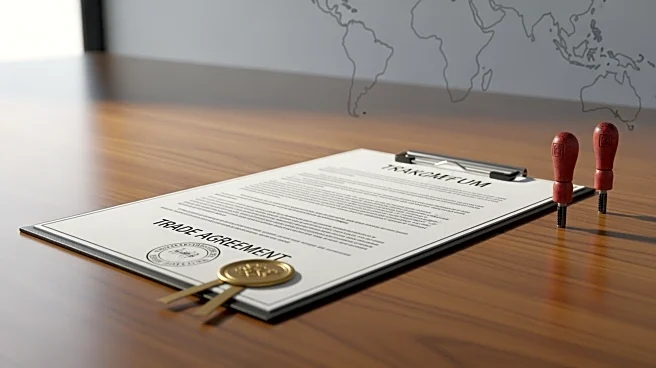What's Happening?
The United States and Vietnam have reached a framework agreement aimed at strengthening bilateral economic relations through reciprocal, fair, and balanced trade. This agreement builds upon the U.S.-Vietnam
Bilateral Trade Agreement signed in 2000. Key aspects of the new framework include Vietnam's commitment to address non-tariff barriers affecting U.S. exports, such as accepting vehicles built to U.S. standards and streamlining regulatory requirements for U.S. medical devices and pharmaceuticals. Additionally, Vietnam will implement obligations under international intellectual property treaties and address U.S. concerns regarding conformity assessment procedures. The agreement also includes commitments to enhance digital trade, services, investment, and cooperation on supply chain resilience.
Why It's Important?
This trade framework is significant as it promises to provide unprecedented market access for exporters from both countries, potentially boosting economic growth and trade volumes. U.S. industries, particularly those in agriculture, aerospace, and pharmaceuticals, stand to benefit from reduced barriers and increased export opportunities. The agreement also highlights Vietnam's willingness to align with international standards, which could enhance its attractiveness as a trade partner. Furthermore, the deal underscores the strategic economic partnership between the two nations, which may influence regional trade dynamics and contribute to stability in Southeast Asia.
What's Next?
In the coming weeks, the United States and Vietnam will work to finalize the agreement, prepare it for signature, and complete domestic formalities necessary for its implementation. This process will involve detailed negotiations to ensure all commitments are met and may require adjustments to existing trade policies. Stakeholders, including businesses and trade associations, are likely to monitor developments closely, anticipating new opportunities and potential challenges. The successful implementation of this agreement could pave the way for further economic collaboration and set a precedent for future trade agreements in the region.
Beyond the Headlines
The agreement may have deeper implications for intellectual property rights and regulatory practices in Vietnam, potentially leading to reforms that align more closely with international standards. This could foster innovation and attract foreign investment, contributing to Vietnam's economic modernization. Additionally, the focus on supply chain resilience and cooperation on export controls reflects broader geopolitical concerns, as both countries seek to mitigate risks associated with global trade disruptions.









